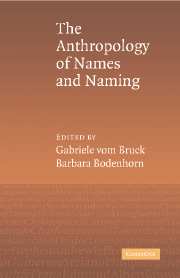Book contents
- Frontmatter
- Contents
- Contributors
- Preface and Acknowledgments
- 1 “Entangled in Histories”: An Introduction to the Anthropology of Names and Naming
- 2 “Your Child Deserves a Name”: Possessive Individualism and the Politics of Memory in Pregnancy Loss
- 3 Why the Dead Do Not Bear Names: The Orokaiva Name System
- 4 The Substance of Northwest Amazonian Names
- 5 Teknonymy and the Evocation of the “Social” Among the Zafimaniry of Madagascar
- 6 What's in a Name? Name Bestowal and the Identity of Spirits in Mayotte and Northwest Madagascar
- 7 Calling into Being: Naming and Speaking Names on Alaska's North Slope
- 8 On Being Named and Not Named: Authority, Persons, and Their Names in Mongolia
- 9 Injurious Names: Naming, Disavowal, and Recuperation in Contexts of Slavery and Emancipation
- 10 Where Names Fall Short: Names as Performances in Contemporary Urban South Africa
- 11 Names as Bodily Signs
- Bibliography
- Index
10 - Where Names Fall Short: Names as Performances in Contemporary Urban South Africa
Published online by Cambridge University Press: 17 August 2009
- Frontmatter
- Contents
- Contributors
- Preface and Acknowledgments
- 1 “Entangled in Histories”: An Introduction to the Anthropology of Names and Naming
- 2 “Your Child Deserves a Name”: Possessive Individualism and the Politics of Memory in Pregnancy Loss
- 3 Why the Dead Do Not Bear Names: The Orokaiva Name System
- 4 The Substance of Northwest Amazonian Names
- 5 Teknonymy and the Evocation of the “Social” Among the Zafimaniry of Madagascar
- 6 What's in a Name? Name Bestowal and the Identity of Spirits in Mayotte and Northwest Madagascar
- 7 Calling into Being: Naming and Speaking Names on Alaska's North Slope
- 8 On Being Named and Not Named: Authority, Persons, and Their Names in Mongolia
- 9 Injurious Names: Naming, Disavowal, and Recuperation in Contexts of Slavery and Emancipation
- 10 Where Names Fall Short: Names as Performances in Contemporary Urban South Africa
- 11 Names as Bodily Signs
- Bibliography
- Index
Summary
NAMING AND PUBLIC SPEECH IN CONTEMPORARY SOUTH AFRICA
“Why can't you just call yourself African Indians?” asked the then president-elect Thabo Mbeki in May 1999 at a meeting with self-styled community leaders drawn from the so-called “Indian community” in Durban. The meeting was held at a beachfront hotel a few weeks before the general elections in 1999 and Mbeki's entourage consisted of a high-powered group of ANC ministers and advisers, many of them of Indian origin. ANC leaders hoped that the meeting could provide a breakthrough among the economically important and resourceful Indians in the city, a group that largely had turned its back on the ANC since the early 1990s.
After having listened to what his advisers dismissed as “perceptions, not rooted in facts,” Mbeki lost his patience with what he saw as a privileged group of people, wanting an unambiguous public recognition in the post-apartheid order but only as Indians. Mbeki continued: “If you called yourself African Indians it would make a major difference in how you are perceived. In this way you'd say to your fellow South Africans, ‘this is my country, I am an African first, but I am also an Indian because my forefathers came here to work.’ …. What is, after all, wrong with being an African?”
Mbeki's remarks were clearly informed by the broader project of an “African Renaissance” which he has made his trademark through high-profile conferences and nebulous rhetoric.
- Type
- Chapter
- Information
- An Anthropology of Names and Naming , pp. 200 - 224Publisher: Cambridge University PressPrint publication year: 2006

